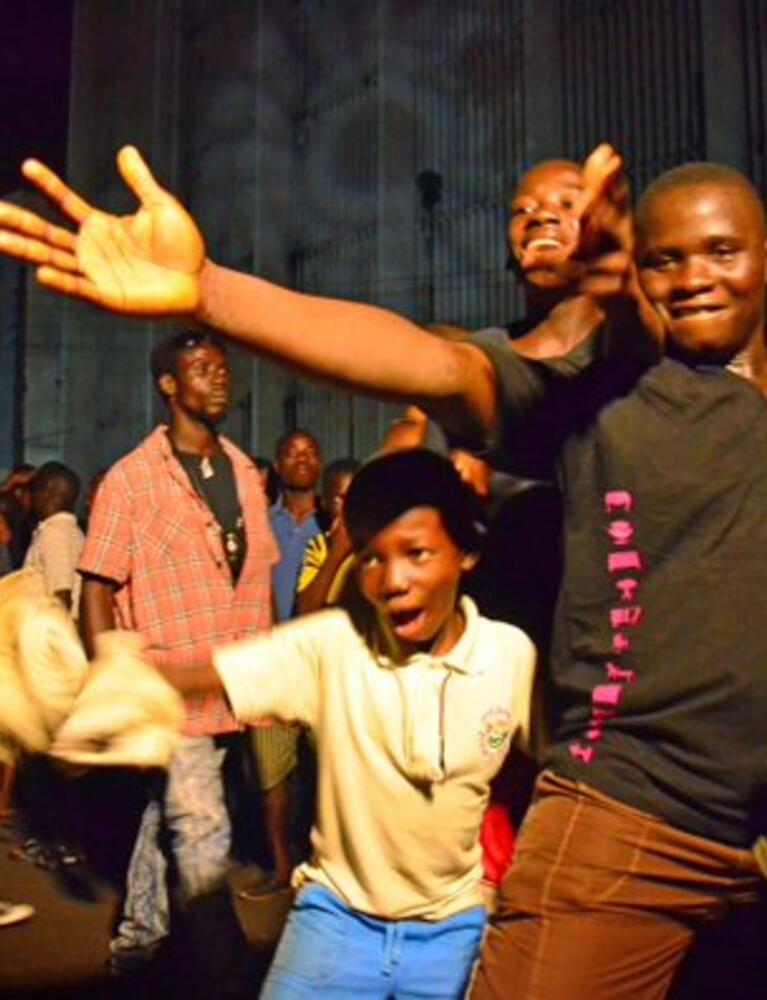Over the weekend of 7/8 November, the Ebola outbreak in Sierra Leone was declared over. Spontaneous celebrations erupted in the capital Freetown, coupled with candlelit vigils to remember those who lost their lives to the disease.
The outbreak, which lasted 17-months, claimed the lives of nearly 4,000 people in Sierra Leone.
Médecins Sans Frontières/Doctors Without Borders (MSF) was one of the first medical organisations to respond. Over the course of the outbreak, we set up and ran four Ebola management centres and one maternity centre, helping more than 860 people to recover from the deadly virus in the country.
The party's progressed to an inter-MSF dance off. Feeling very lucky to be here at this incredible moment #zeroebola pic.twitter.com/S24w08BVkI
— Nick Owen (@nickoowen) November 7, 2015
MSF's teams in Freetown gathered on Saturday night to mark the end of the Ebola outbreak.
But, the threat of the disease is still very real.
"The outbreak may be over in Sierra Leone, but as long as Ebola is still present in Guinea, the disease will stay on its neighbour’s doorstep and there will be a risk of new cases," said Armand Sprecher, an MSF public health specialist and Ebola expert.
We look at the ongoing issues through the eyes three Ebola survivors.
Aminata Koroma, a 24-year-old Ebola survivor at her home in the village of Mabekoh
Koroma survived the disease after being treated by MSF in Kailahun, but four members of her family died.
“After my father died they quarantined us,” she said.
“Then my head began to hurt so I called 117. They sent me to Kailahun and I was discharged five days later. My granny, my uncle and my brother also died.
"After two weeks I went back to hospital as I had a persistent cold, and I have still have some pain in my back, but now it is not bad.
"The community were not afraid of me when i came back. When they ate they would call me to come and join them.”
After Koroma’s father died she was forced to drop out of school. Now she sells chilli at the market to try and save enough to go back to school to complete her exams.
Ongoing health problems
Three new patients (including a pregnant woman) were admitted to MSF’s Ebola management centre in Guinea's capital, Conakry, two weeks ago, and a baby was born with the disease. Thankfully, the child is still alive.
Now, in Sierra Leone, focus must be turned towards the survivors of the viral haemorrhagic disease.
There are an estimated 15,000 Ebola survivors in West Africa, 4,000 of whom are in Sierra Leone. Many are currently experiencing ongoing physical and mental health problems.
The physical problems include joint pain, chronic fatigue, hearing difficulties and eye problems, which could lead to blindness without prompt access to specialised care.
Sorie Kamara, a 25-year-old Ebola survivor photographed in his house in the village of Mabekoh
Kamara, 25, used to farm rice and cassava before catching Ebola, he is now too weak.
“I got Ebola in October last year. They took me to Bo and I was inside for 10 days. I felt so happy when I survived, but then three months later I stated to feel pain in my chest and my joints. I feel so weak I can’t go to the farm any more. Now I have no work. I just spend all day sitting down."
Passionate about football, Kamara says he can still play but it’s not like before. He’s much less fast now, and the friend he used to play with died during the outbreak.
Unlike some survivors who were ostracised by fearful relatives, Kamara says the community encouraged and supported him after he was discharged, “they took me back just like before," he said.
Difficulty accessing health services
The experience of being infected with Ebola and spending time in an Ebola management centre, as well as all the fear surrounding the virus, can lead to severe depression, post-traumatic stress disorder and mental health problems, including persistent nightmares and flashbacks.
But despite their needs, Ebola survivors can have difficulties accessing health services.
Today, there is still some fear among health workers about treating Ebola survivors, while accessing health services can be economically challenging for people who have lost their jobs.
It is essential that health authorities and all those involved coordinate their efforts to guarantee timely access to free quality care for survivors and their families.
Isatu Koroma, a 40-year-old Ebola survivor photographed outside her house in Kumrabai village
Rapid response is essential
The announcement by the World Health Organisation on Saturday was a bittersweet moment for Sierra Leone. The country's already weak public health system has been seriously damaged by the epidemic.
More than 200 health workers died of the virus in Sierra Leone, including MSF staff.
This time last year, #SierraLeone was at the peak of the #Ebola outbreak. Today, the MSF team celebrates zero cases. pic.twitter.com/2NSLwdECDV
— Nick Owen (@nickoowen) November 9, 2015
In order to ensure a tragedy of this magnitude does not befall Sierra Leone, Liberia and Guinea again, a sustained and well-functioning surveillance and rapid response system is essential to maintain zero cases of Ebola across West Africa.






